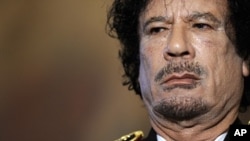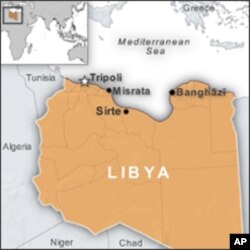Celebrations are underway across Libya, where officials of the interim government say the country's former leader Moammar Gadhafi has been killed, and other members of his inner circle captured or also dead. The killing came as fighters loyal to the National Transitional Council took control of Gadhafi's hometown of Sirte, and the last major stronghold of the old government.
|
VOA's Elizabeth Arrott speaks with London coverage editor Mary Motta about the mood in Libya in the wake of the death of former leader Moammar Gadhafi:
|
Libya's provisional government officials say that Moammar Gadhafi was killed during a battle for control of Sirte. The prime minister of Libya's National Transitional Council, Mahmoud Jibril, confirmed Gadhafi's death at a news conference in Tripoli.
Jibril said Libyans have been waiting for what he called "this historic moment." He said an investigation as to how and by whom Gadhafi was killed is underway. Video of what appeared to be Gadhafi's lifeless body, on the ground and partially unclothed, appeared midday Thursday.
Related video report by Carolyn Presutti.
Later, Arabic television channels showed what appeared to be Gadhafi shortly after his capture, still alive and struggling with those around him. The images spread quickly, and across Libya, where he had ruled with a ruthless grip for four decades, the news prompted massive, spontaneous celebrations.
In Tripoli's main Martyrs' Square, crowds gathered and cheered the news as the definitive end to a dark period in Libya's history. An engineer, who gave only his first name, Osama, describes the scene.
"All the people go out and they celebrate and feel so happy about the end of this Gadhafi's regime and everyone, even the families, the children, the old people, all are out to celebrate this moment. This moment is very happiness moment now,"
His friend, Fitori Abdl Khadr, also speaking to VOA by phone from Tripoli, says he has no regret that Gadhafi was killed, rather than face justice in a trial.
Abdl Khadr, who took part in the NTC's capture of Tripoli two months ago, says sentiment on the streets is that his death brings "this farce" to an end.
In Benghazi, thousands turned out on the streets where the uprising against Gadhafi began nine months ago.
|
Marc Ginsberg, former presidential adviser and ambassador to Morocco, discusses what's next for Libya:
|
The end of Gadhafi's two months on the run and the capture of Sirte mark a turning point in the NTC's efforts to consolidate its control of the country.
NTC officials have said control of Sirte would set in motion a series of political moves leading to elections, a new government and a new constitution - a massive undertaking in a country where the majority had known nothing "but the arbitrary rule of one man."
The capture of Sirte follows NTC success in another pro-Gadhafi bastion, Bani Walid, earlier this week. Fighting still continues in southern areas of the country, the vast desert regions bordering Niger, Algeria and Chad.
But control of Gadhafi's hometown provides a geographic as well as symbolic victory, uniting the main population corridor along the coast from east to west.
Libya scholar Ziad Akl of the Ahram Center in Cairo says Gadhafi forces are in a struggle for survival.
"The forces that are pro-Gadhafi, first of all, they are not politically organized, they are not strategically outlined, and they are not fighting actually to gain ground. They are simply trying to defend the positions they have and stop the revolution from moving on and this is a time- constrained battle," said Akl.
A major portion of that battle ended Thursday with Gadhafi's body reportedly shipped to a mosque in Misrata.
Skype interview with VOA Elizabeth Arrott in Cairo





